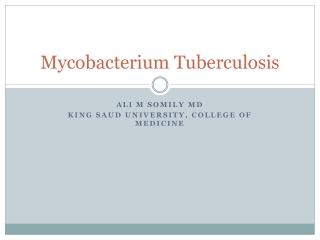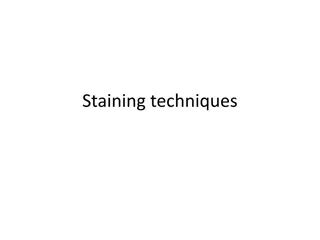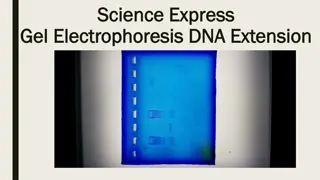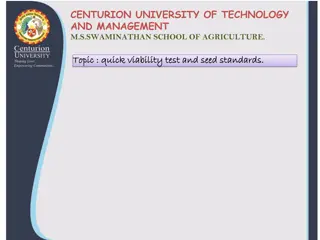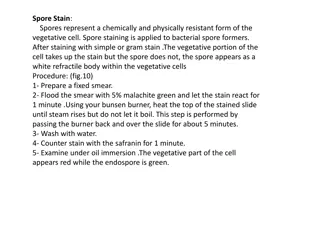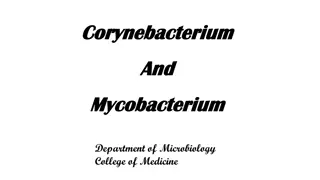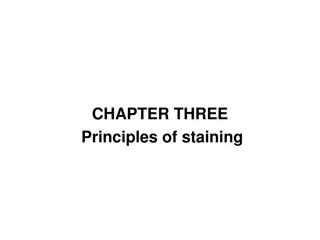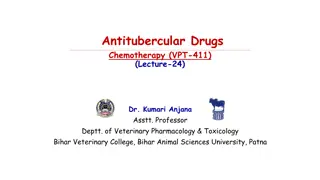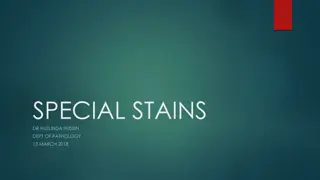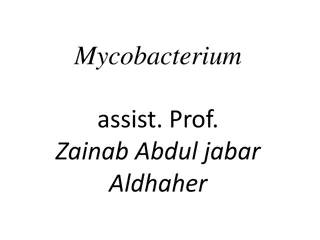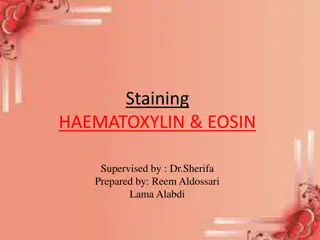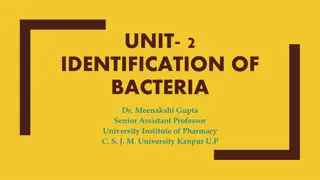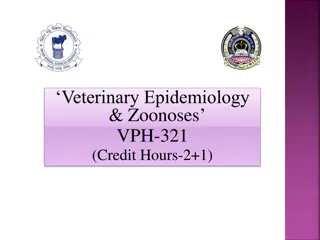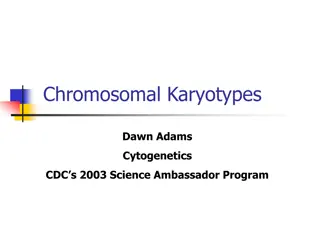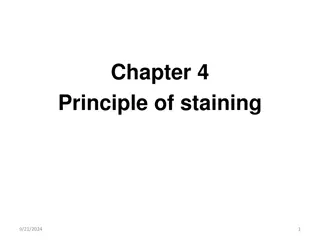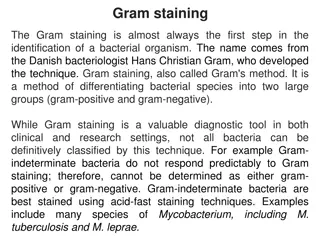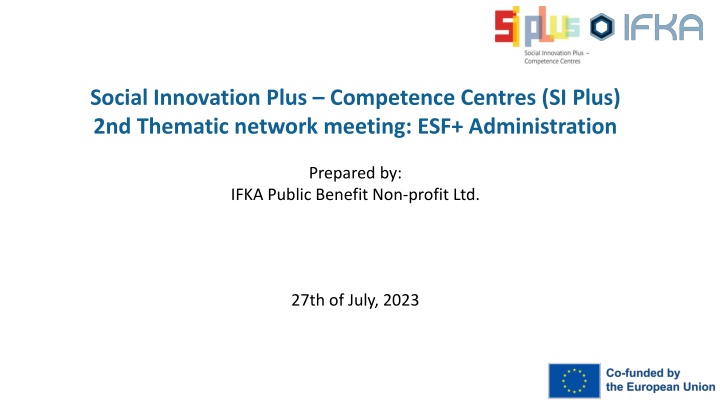
Mycobacterium: Characteristics and Staining Techniques
Mycobacterium is a genus of bacteria with notable species like Mycobacterium tuberculosis. Explore its morphology, staining methods, and common specimen sources in the lab. Learn about the Ziehl-Neelsen technique for identifying these acid-fast bacilli.
Download Presentation

Please find below an Image/Link to download the presentation.
The content on the website is provided AS IS for your information and personal use only. It may not be sold, licensed, or shared on other websites without obtaining consent from the author. If you encounter any issues during the download, it is possible that the publisher has removed the file from their server.
You are allowed to download the files provided on this website for personal or commercial use, subject to the condition that they are used lawfully. All files are the property of their respective owners.
The content on the website is provided AS IS for your information and personal use only. It may not be sold, licensed, or shared on other websites without obtaining consent from the author.
E N D
Presentation Transcript
Social Innovation Plus Competence Centres (SI Plus) 2nd Thematic network meeting: ESF+ Administration Prepared by: IFKA Public Benefit Non-profit Ltd. 27th of July, 2023
Content 1. ESF+ for boosting social innovation in Hungary 1.1 Human Resources Development OP Plus (HRDOP Plus) 1.1.1 Emerging Settlements Programme 2. Activities of SI Plus to support ESF+ administration in Hungary 3. Strategic recommendations for developing the social innovation Ecosystem in Hungary 3.1. Results of mapping 3.1.1 Ecosystem map 3.1.2 SWOT analysis 3.1.3 Problems and intervention needs 3.2 Vision 3.3 Priorities and Objectives 3.2.1 Operational Structure
1. ESF+ for boosting social innovation in Hungary 1.1 Human Resources Development OP Plus (HRDOP Plus) Overall objective: Supporting social integration in Hungary EU funding: 2,908,040,936 EUR ERDF: 145,272,914 EUR ESF+: 2,762,768,022 EUR Priority 6. Supporting People in Needs Priority 7.1. Emerging Settle-ments Programme (Socially Innovative Initiatives) Priority 7.2. Emerging Settle-ments Programme Priority 5. Family and Youth Develop- ments Priority 1. 21st Century Public Education Priority 3. Develop- ments For Social Inclusion Priority 4. Social Develop- ments Priority 2. Teachers Career Model PO4 - a more social and inclusive Europe
1. ESF+ for boosting social innovation in Hungary 1.1.1 Emerging Settlements Programme Emerging Settlements Programme = Social innovation axis of HRDOP Plus Target area: 300 most disadvantaged settlements of Hungary (1057/2021. (II. 19.) government decision) Target Groups: People living (or leaving) the emerging settlements Professionals providing public services in the emerging settlements Beneficiaries: 310.000 inhabitants 64.000 inhabitants under age 14 5.000 new born babies yearly
1. ESF+ for boosting social innovation in Hungary 1.1.1 Emerging Settlements Programme Managing Authority Responsible policy body Professional coordinator Implementing bodies Antecedents, inspiring practices Emerging settlements programme Hungarian Charity Service of the Order of Malta Continous and active social work in the settlements Hungarian Charity Service of the Order of Malta Presence Spots Ministry of Interior of Hungary Philanthropic and church Settlement-level needs assessment and diagnosis Prime Minister s Office organizations Diagnosis-based tailor-made & complex services ( from conception to employment ) Gap-filling services (e.g. intensive care of children under 3 years) New services and models (e.g telemedicines)
2. Activities of SI Plus to support ESF+ administration in Hungary 1. Mapping 2. Competence Centre set-up 3. Competence centre integration 4. Strategy planning Methods: Adapting the SI Plus survey Desk research SI competence centre activities integrated in IFKA activities Cooperation agreement with TinLab (SiLab) 15.10.2022 Cooperation agreement with NKTK (NCSMO) EaSI NCP Regional contact points (Veszpr m, Miskolc, Budapest) Cooperation focus areas: Policy support and strategy development Information services Networking Supporting ESF+ MAs Prime Minister s Office: EDIOP+, HRDOP+ MA Policy advisory board Needs: integrating SI related evaluation criteria in the evaluation of subsidy programmes for competitiveness development National SI Competence Centre online platform visibility, narratives, evaluation IFKA Social Innovation Award: national SI idea contest good practice identification Scaling SI good practice MarketMate SE pre-evaluation system IFKA Social Innovation Award evaluation of SI Shared with BG ESF+ MA Results: Criteria of SI in Hungary Focus areas of SI in Hungary SI ecosystem map SWOT Support schemes for SI (EU and national funding) Good practices Strategic Recommendations for the Development of the Hungarian SI Ecosystem 3.7.2023
3.1.1. Strategic recommendations Results of mapping Ecosystem map
3.1.2. Strategic recommendations Results of mapping SWOT analysis Strengths Weaknesses Active and cooperative ecosystem SI trainings SI workshops (labs, experimental facilities) Targeted funding programmes focusing on the development of SI (national and EU resources) Good practices Lack of conceptual, legal and regulatory frameworks Lack of awareness, visibility and consciousness Underdevelopment of funding programs and financing structures Lack of social innovation management competencies Lack of methodologies, practices and capacities for analysing and identifying social innovations Lack of adaptation and scaling methodologies Opportunities Threats Strengthening policy intentions and awareness regarding the development of social innovation on the EU level Emerging new demands and market gaps (new societal problems) ESG/CSRD Stregthening R & D & I sector in Hungary Supportive strategies (R&D&I, SME ) Cross-sectoral, interdepartmental collaborations Hungarian R&D&I performance lagging behind of the EU average Structural problems of financing SI (cyclicality, narrowing non- refundable resources) Crises of relevant sectoral ecosystems (rural economies, healthcare, education, social sector, higher education etc.) Missing culture of supporting social innovation (different levels of the public sector)
3.2. Strategic recommendations Vision Our vision is to create a social innovation ecosystem by 2030 that is fully functional, that means it... 1. supports the awareness, acceptance and recognition of social innovation at different levels of the society builds on cooperation and networks between the various actors of social innovation helps to develop new solutions for existing social (social, healthcare, environmental, etc.) problems supports social innovation becoming complementary to other (technological, business, etc.) innovations and thus contributing to the strengthening of the country's resilience and competitiveness overall, supports social well-being in Hungary in an effective and measurable way. 2. 3. 4. 5.
3.3. Strategic recommendations Priorities and Objectives HO1 Generally accepted, uniform definition of social innovation HO2 Integration of social innovation into the domestic legislative environment HO3 National Social Innovation Strategy P1 Enabling Regulatory Environment P2 A support environment that fits with characteristics of the ecosystem HO4 Targeted support programs that fit with the characteristics of social innovation HO5 Integration of social innovation aspects into social, technological and economic development support programs HO6 Diversification of funding TO1 Development of knowledge production TO2 Development of knowledge exchange TO3 Development of knowledge application -SO1 Increasing research research programs dealing with SI -SO2 Increasing researchers working on SI research projects -SO3 Education of young researchers and scholars -SO4 Development of the capacities needed to identify and understand SI -SO5 Creation of a uniform collection of social innovation good practices -SO6 Partnerships knowledge production civil society, public sector, private sector) the number and of -SO12 Supporting for the incubation of social innovations -SO13 Integration of aspects and goals economic/technological programs -sO14 Development adapting and scaling social innovations -SO15 Establishing supporting the adaptation and scaling of social innovations centers targeted -SO7 accessibility programs -SO8 Integration of social innovation aspects into technological, economic and social training programs -SO9 Promoting social innovation and increasing its visibility -SO10 Providing research results and good practices -SO11 Development professional/thematic supporting the knowledge exchange Increasing the targeted number and of training social innovation into incubation the number of the P3 Developed SI knowledge management of capacities for collaborations open access to of supporting (academia, networks
3.3.1 Strategic recommendations Operational Structure P1 Supportive Regulatory Environment Operational Structure TinLab Role: P1 - HO1, HO2, HO3; P2 HO4, HO5, HO6; P3 TO1, TO2, TO3 Research projects Thematic forums Experimental and pilot projects Trainings Regional contact points Cooperation agreement Cooperqation agreement National Cultural Support Management Organization-EaSI NCP IFKA Social Innovation Competence Centre Role: P1 - HO2, HO3; P2 HO5, HO6; P3 TO2, TO3 Support for policy and strategy developments Strengthening links between the ecosystem and policy actors Connecting the domestic ecosystem with the international social innovation community (EU and national competence centers) Domestic promotion of international experiences and good practices Role: P1 - HO3; P2 HO6; P3 TO2 Information service (help desk, events, website, social media, etc.) on social innovation development resources available within the framework of EaSI Connecting the domestic ecosystem with the international social innovation community (ESFA and other contact points) Cooperation agreement
Thank you for your attention! Nov k Csaba, PhD. Email: novak@ifka.hu Szenttam si Istv n Tam s Email: szenttamasi.tamas@ifka.hu

